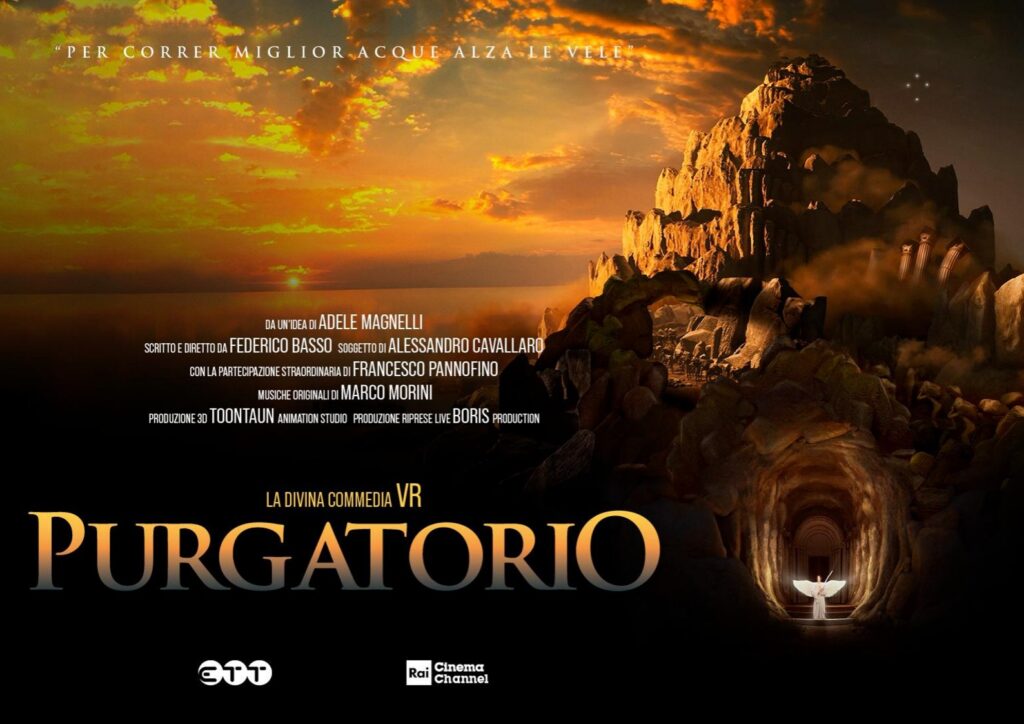
Inferno and Purgatory VR feature in the Rai Cinema corner in the new section of the “Agora Expo” festival
Gazometro (Rome), 06 July 2023 – From 13 to 16 July, during the 6th edition of Videocittà, the short-film Inferno (Hell) and the new second chapter Purgatorio (Purgatory) of The Divine Comedy VR will be presented in the Rai Cinema corner on all event days. The ETT (Gruppo SCAI) production is distributed by Rai Cinema (also available on RaiPlay and Rai Cinema Channel in a version for the deaf and blind, in collaboration with Rai Pubblica Utilità) and will be featured in the new section of the Videocittà festival: “Agorà Expo”, the new exhibition area set up on the ground floor of the Gazometro G3.
Videocittà was conceived by Francesco Rutelli, with the creative leadership of Francesco Dobrovich. It explores the most advanced forms of audio-visual and digital languages in a domestic and international cultural context. Following last year’s success, which recorded over 15,000 visitors, the festival’s heart will beat again in Europe’s largest industrial archaeology area: the Rome Gazometro. In a perspective of continuity with the previous edition, this year’s theme will again be Transition, i.e. a participatory, shared process based on pragmatic and concrete choices; thus making the festival a vehicle of ethical and civic values. With Eni, the Main Partner, and the contribution of MiC, the Lazio Region, the Municipality of Rome and in collaboration with ANICA, there will be four days of artistic contamination, taking in immersive creations, video art, talks, live music and AV Performances. These will shape the entire complex and place the public at the centre of a collective experience going beyond the real world and flowing into a digital one.
In the new “Agora Expo” area, among the works on display are short Virtual Reality films produced and distributed by Rai Cinema, and the creations of leading companies at the national level. Among these are Hell and the new chapter of The Divine Comedy VR: Purgatory, which recently won the Best Industry Paper Award at the eighth edition of the International XR-Metaverse Conference (Las Vegas). Based on an idea by Adele Magnelli, the short film was written and directed by Federico Basso. The story outline is by Alessandro Cavallaro, who oversaw the scientific supervision and selection of the verses.
Purgatory: the short film lasts for about eight-and-a-half minutes, accompanied by the voice of the actor Francesco Pannofino, and lets the viewer take on the role of the Great Poet, crossing the threshold of Purgatory to embark on the journey. Purgatory manifests itself in all its grandeur as a rocky mountain standing in the ocean at the centre of the southern hemisphere. After leaving Hell, the passage of time is allowed in this realm, so there is dawn and dusk, day and night, with light shown in all its shades. After entering this primordial scenario, the spectator will cross the threshold of Purgatory and see, through Dante’s eyes: a door in the rock, guarded by an angel wielding a sword. The first frame shows the proud: souls weighed down by huge boulders looking resignedly at the ground. Scenes of humility and pride are represented: stories sculpted in prodigiously animated high reliefs that “visibly speak”. Then follows the pain of envious souls slumped on the ground, with their eyes sewn shut, and the lustful who advance dramatically into the fire of the final frame. When he finally arrives in the Terrestrial Paradise, the woman who caused Dante to travel through the first two kingdoms appears. It is Beatrice, rekindling the ancient fire of love, followed by the promise of the final stage in Heavenly Paradise. After a distressing repentance, Dante is finally ready to extinguish the memory of every sin and is now “pure and willing to ascend to the stars”. The scenes were entirely modelled, sculpted and coloured in 3D. Animation of plants, fire and water used physical parameters, making the simulations interact with up to 100 million particles. For close-ups of human figures, which in Purgatory are more central than in Hell, we opted for compositing integration with actors filmed in green screen to show facial expressions. Crowd scenes were created by shooting real movements of actors (MOCAP: motion capture) and transferring these movements into 3D characters. Additionally, the original soundtrack was composed by Marco Morini, paying particular attention to sound design which enriches the all-round viewer experience.
